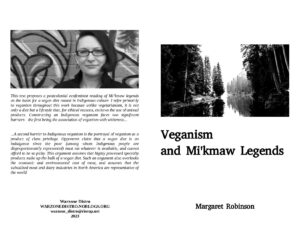
From back cover:
“This text proposes a postcolonial ecofeminist reading of Mi’kmaw legends as the basis for a vegan diet rooted in Indigenous culture. I refer primarily to veganism throughout this work because unlike vegetarianism, it is not only a diet but a lifestyle that, for ethical reasons, eschews the use of animal products. Constructing an Indigenous veganism faces two significant barriers—the first being the association of veganism with whiteness…
…A second barrier to Indigenous veganism is the portrayal of veganism as a product of class privilege. Opponents claim that a vegan diet is an indulgence since the poor (among whom Indigenous people are disproportionately represented) must eat whatever is available, and cannot afford to be so picky. This argument assumes that highly processed specialty products make up the bulk of a vegan diet. Such an argument also overlooks the economic and environmental cost of meat, and assumes that the subsidized meat and dairy industries in North America are representative of the world.”